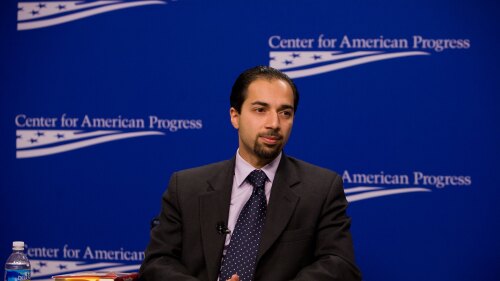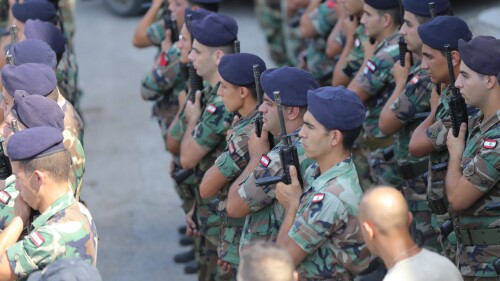A U.S.-based Iranian American organization has uncovered what they say is new evidence against Oberlin College’s “Professor of Peace” Mohammad Jafar Mahallati, leading Amnesty International to publish a critical report about the liberal arts school professor’s alleged cover-up of the mass murder of at least 5,000 Iranian dissidents in 1988.
Mahallati, the highest-ranking former Iranian regime official living in the U.S., teaches Islam at Oberlin College near Cleveland, Ohio.
Amnesty issued a 17-page report earlier this month over the alleged cover-up of crimes against humanity involving Mahallati, his counterpart at the U.N. in Geneva and other diplomats.
“Such crimes are not relics of the past,” said Diana Eltahawy, Amnesty International’s deputy director for the Middle East and North Africa, about the 1988 massacre and in a reference to the present crackdown.
According to the Amnesty report titled “Involvement of Iran’s former diplomats in covering up the 1988 prisoner massacres,” it noted that in the face of detailed U.N. and Amnesty investigations, and in addition to their calls on the Iranian authorities to conduct an inquiry, the new report from Amnesty stated that “Mahallati continued to advance the government’s strategy of denial and distortion.”
“As Iran’s Permanent Representative to the U.N. in New York at the time, Mohammad Jafar Mahallati played a particularly active role in seeking to undermine credible reports by the then U.N. Special Rapporteur on the situation of human rights in Iran and by Amnesty International, and to weaken the U.N.'s response. In November 1988, he denied reports of mass executions at a meeting with the U.N. Rapporteur and falsely claimed that ‘many killings had in fact occurred on the battlefield,’” declared the London-based human rights organization Amnesty International.
Bazargan: In light of this new evidence, we conclude with certainty that Mr. Mahallati was aware of the executions and was in a position to stop them from happening.
Lawdan Bazargan, the lead organizer for the Alliance Against Islamic Regime of Iran Apologists (AAIRIA), whose group uncovered new media articles and material from the 1988 massacre that was used by Amnesty, told Fox News Digital, “In light of this new evidence, we conclude with certainty that Mr. Mahallati was aware of the executions and was in a position to stop them from happening.”
Bazargan added, “We find him negligent and complicit for failing to use his position at the U.N. to draw public attention to the Islamic Regime or Iran’s crimes against humanity, prevent further executions, and mislead the U.N.” AAIRA has urged Oberlin College to summarily fire Mahallati.
Iran executed Bazargan’s 29-year-old brother, Bijan, in 1988 for his left-wing views. Iran’s regime incarcerated Lawdan in Tehran’s infamous Evin prison for her political dissident activities.
Hamid Charkhkar, a professor of biomedical engineering at Case Western Reserve University in Cleveland and a member of AAIRIA, located a key Financial Times article from Aug. 17, 1988, that stated, “Iran has resorted to mass executions of political prisoners.” The article added, “systematic executions of leftist prisoners, both Marxist and Islamic ... greatly accelerated... particularly since the incursion into Western Iran by Iraqi-backed Islamic leftists (People’s Mujahedin).”
Amnesty and Iranian dissidents argue that Mahallati should have had knowledge about the unfolding mass murder due to the Financial Times article along with other media reports, Amnesty’s urgent warning notices at the time, and the self-immolation of Iranian dissident Mehrdad Imen protesting the 1988 massacre in front of the U.N.
Amnesty wrote in its 2018 study of the massacre that “minimum estimates put the death toll at around 5,000" between July to September 1988.
Amnesty wrote in its 2018 study of the massacre that “minimum estimates put the death toll at around 5,000" between July to September 1988.
Most of the Iranian political prisoners executed by the regime were affiliated with the Mujahedin-e Khalq (MEK). Additional victims were from the leftist Tudeh Party, the left-wing Fadaiyan Khalq Organization (FKO), and Kurdish organizations (Komala and the Kurdish Democratic Party of Iran).
Ali Safavi, a member of the Foreign Affairs Committee of the Paris-based National Council of Resistance of Iran, told Fox News Digital that he believes the number of those killed is much higher, “It is regrettable and shocking that criminals, who either directly or indirectly enabled the executioners in Iran, including regime president Ebrahim Raisi, to not only massacre 30,000 political prisoners, mostly from the Mujahedin-e Khalq (MEK), but also to help cover it up, have not been held accountable. Using the cover of a diplomat or an academic should not allow them to escape justice and accountability.”
Andrea Simakis, the director of media relations for Oberlin College, acknowledged receipt of a Fox News Digital press query. She told the local paper Chronicle-Telegram last week that the college would not be able to meet the paper’s Monday deadline. After a week, the college and its trustees have not answered media questions about the new Amnesty report. Fox News Digital reached out to Mahallati, and a number of Oberlin trustees.
The Iranian Nobel Peace Prize laureate Shirin Ebadi slammed Oberlin’s investigation for whitewashing the crimes against humanity leveled against Mahallati.
Oberlin College issued a fact sheet on its website in October 2021, declaring, “After consulting a number of sources, and evaluating the public record, the College could find no evidence to corroborate the allegations against Professor Mahallati, including that he had specific knowledge of the murders taking place in Iran.”
Oberlin declined to release its investigative report on Mahallati. The Iranian Nobel Peace Prize laureate and lawyer Shirin Ebadi slammed Oberlin College’s investigation for whitewashing the crimes against humanity leveled against Mahallati. Ebadi urged Oberlin College President Carmen Twillie Ambar to initiate a new independent investigation into Mahallati’s reported crimes.
Mahallati has denied the allegations against him since they were first raised in October 2020. Mahallati said in October 2021, “It is important to note that my accusers have not found a single statement from me that is remotely consistent with their unfounded accusations.”
Bazargan said, “We also condemn the college for continually defending a known human rights abuser and failing to meet with the victims’ families, look at their evidence and listen to their stories.”








